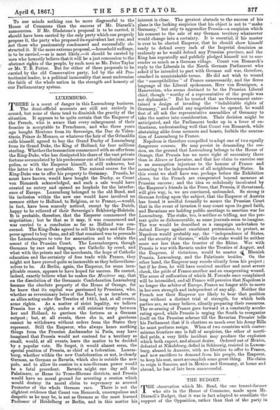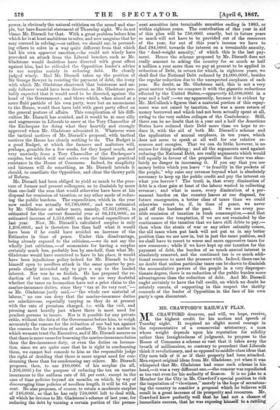THE BUDGET.
THE observation which Mr. Read, the one tenant-farmer who sits in the House of Commons, made upon Mr. Disraeli's Budget, that it was in fact adapted to conciliate the support of the Opposition, rather than that of the party in power, is obviously the natural criticism on the sound and sim- ple, but bare financial statement of Thursday night. We do not blame Mr. Disraeli for that. With a great problem before him which he is at least ambitious to solve, and now sanguine that he may succeed in solving,—or rather, we should say, in persuad- ing others to solve in a way quite different from that which had his own apparent sanction,—he could not wisely have provoked an attack from the Liberal benches, such as Mr. Gladstone would doubtless have directed with great effect against him, had he ridiculed the Opposition leader's advice to use surplus mainly in reducing debt. He clearly judged wisely. Had Mr. Disraeli taken up the position of Sir George Bowyer in resisting the payment of debt, the irony with which Mr. Gladstone chastened that boisterous and un- ruly follower would have been directed, as Mr. Gladstone pro- bably expected that it would need to be directed, against the head of the Government ; and blows which, when aimed at a mere fluid particle of his own party, were but an amusement to the House, would then have told with great party effect on the general posture of affairs. This complication of his diffi- culties Mr. Disraeli has avoided, and it would be at once silly and ungenerous in Liberals to sneer at the Tory Chancellor of the Exchequer for doing what they heartily and strongly approved when Mr. Gladstone advocated it. Whatever were the tactical motives of Mr. Disraeli's proposal, with tactical motives the House has clearly nothing to do. The Budget is a good Budget, at which the farmers and maltsters will, perhaps, grumble for a few weeks, for they hoped much, and very unwisely, from a Tory Chancellor of the Exchequer's surplus, but which will not excite even the faintest practical resistance in the House of Commons. Indeed, its simplicity and fairness will do something, as Mr. Disraeli intends it should, to conciliate the Opposition, and clear the thorny path of Reform.
Mr. Disraeli had been obliged to yield so much to the pres- sure of former and present colleagues, as to diminish by more than one-half the sum that would otherwise have been at his disposal for remission of taxation, or any other mode of reduc- ing the public burdens. The expenditure, which in the year now ended was actually 66,780,0001., and was estimated by Mr. Gladstone at rather more, namely, 67,031,0001., is estimated for the current financial year at 68,134,000/., an estimated increase of 1,354,000/. on the actual expenditure of last year. Now, Mr. Disraeli's calculated surplus is only 1,206,000/., and is therefore less than half what it would have been if he could have avoided an increase of the Estimates in time of peace. Under this disadvantage, being already exposed to the criticism,—we do not say the wholly just criticism,—of economists for having a surplus certainly much less, probably less by one-half, than what Mr. Gladstone would have contrived to have in his place, it would have been injudicious policy indeed for Mr. Disraeli to lay himself open to needless attack in the same quarter by pro- posals clearly intended only to give a sop to the landed interest. Nor was he so foolish. He has proposed the re- duction of but one tax, and though we are very doubtful whether the taxes on locomotion have not a prior claim to the marine-insurance duties, since they "tax at its very root,"— as Mr. Gladstone justly said,—" the whole raw material of labour," no one can deny that the marine-insurance duties are mischievous, especially varying as they do at present with the rate of premium charged, i.e. with the risk, and pressing most heavily just where there is most need for prudent persons to insure. Nor is it possible for any private critic, without the data of the Government before him, to weigh accurately the reasons for the reduction of one bad tax against the reasons for the reduction of another. This is a matter in which we must trust the Executive, and if Mr. Disraeli assures us that there is more cause for lessening the marine-insurance duties than the fire-insurance duty, or even the duties on locomo- tion, since we are quite sure that he is right in condemning them, we cannot but concede to him as the responsible judge the right of deciding that there is more urgent need for con- demning these than for condemning any others. Mr. Disraeli proposes, then, to use 210,000/. of his surplus (in all, 1,206,000/.) for the purpose of reducing the tax on marine insurances to the uniform rate of 3d. per cent., except in the case of time policies beyond six months, on which, by way of discouraging time policies of needless length, it will be 6d. per cent. He also proposes, of course, to retain a moderate surplus of 246,0001., so that he has only 750,000/. left to deal with, all which he devotes to Mr. Gladstone's scheme of last year, for reducing the debt by turning a certain portion of the perma- nent annuities into terminable annuities ending in 1885, or within eighteen years. The contribution of this year in aid of this plan will be 750,000/. exactly, but in future years so much will not have to be provided out of the resources of the year, for out of this year's income we have to find 284,000/. towards the interest on a terminable annuity, the dead-weight annuity,' of which this is the last pay- ment. Hence the scheme proposed by Mr. Disraeli does not really amount to asking the country for so much as half a million a year more than we pay at present to be applied in reduction of Debt, in return for which, in eighteen years, we- shall find the National Debt reduced by 24,000,000/., besides the regular reduction due to the unexpected surpluses of each year. No doubt, as Mr. Gladstone said, this is not a very great matter when we compare it with the gigantic reductions effected by the United States,—apparently 42,000,000/. in year and a half ;—we say apparently, because it is evident by Mr. McCulloch's figures that a material portion of • this repay- ment was not raised by taxation, but was a mere return of money borrowed and which had not been actually spent at all„ owing to the very sudden collapse of the Confederacy. Still, there can be no doubt that in a year and a half the American States have reduced their Debt more than we hope to re- duce it, with the aid of both Mr. Disraeli's scheme and. the application of annual surpluses, in ten years, which does not seem to speak at all well for our relative re- sources and energies. That we can do little, however, is no excuse for doing nothing ; and all the arguments used against reducing the National Debt, are really arguments which would tell equally in favour of the proposition that there was abso- lutely no danger in increasing it. If you say that you use- money better which you leave "to fructify in the pockets of the people," why raise any revenue beyond what is absolutely necessary to keep up the public credit and pay the interest on what you borrow ? The truth is, that every diminution or debt is a clear gain at least of the labour wasted in collecting revenue ; and what is more, every diminution of a per- manent burden on the country leaves at our disposal, for- future emergencies, a better class of taxes than we could otherwise resort to, if, in time of peace, we never- paid off the burdens of the past. If we use every pos- sible remission of taxation in fresh consumption,—and that is of course the temptation, if we are not reminded by the- continuance of the taxation that we have still debts to pay,— then when the strain of war or any other ag]anlity comes, the old taxes when put back will not put us in any better- position than we are now in, but in just the same position, and we shall have to resort to worse and more oppressive taxes for new resources ; while if we have kept up our taxation for the- payment of debt, the burden of so much annual interest is- absolutely removed, and the continued tax is so much addi- tional resource to meet the pressure with. Indeed, there can be- no doubt that unless particular taxes can be shown to diminish the accumulative powers of the people in a very dispropor- tionate degree, there is no reduction of the public burden more- advantageous than the reduction of debt. And Mr. Disraeli ought certainly to have the full credit, on which no doubt he- astutely counts, of supporting in this respect the thrifty counsels of the leader of Opposition in the face of his own party's open discontent.































 Previous page
Previous page